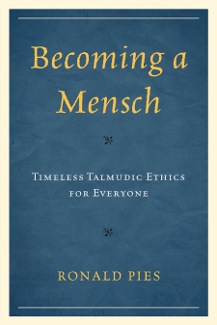The First Self-Help Guide
By Helene Ragovin
In his new book, psychiatrist Ronald Pies looks to the Talmud for lessons on how to become a mensch

“Part of the reason for writing the book was to encourage people to do a kind of moral inventory,” says Ronald Pies. Photo: Yoon S. Byun
“For I have given you good instruction … ”
That phrase is included in the passage recited by Jews at the close of the weekly Torah service, and refers to the teachings of the Jewish scriptures.
The Tufts psychiatrist Ronald Pies has taken the idea of these “good instructions” in a slightly different direction. Pies, a clinical professor at the School of Medicine, has written Becoming a Mensch: Timeless Talmudic Ethics for Everyone (Hamilton Books, 2011), a look at negotiating the ethical and moral dilemmas of modern life with guidance from the lessons of the Talmud, the collection of commentary—the “user’s manual,” as Pies dubs it—on the Torah.
The goal, as reflected in the title, is to move closer toward being a mensch, the Yiddish term for a person worth admiring and emulating. Pies stresses the word “becoming” in the title—for total menschlichkeit is a state rarely achieved. “I don’t think anyone, with the exception of a few saints, can honestly say that he or she is already a mensch,” he says. The slim volume is distinctly not geared just toward Jews; Pies approaches issues such as humility, retribution, prudence, integrity and fidelity using contemporary examples and expands his discussion in a most—dare we say it?—catholic fashion.
This is not the first time Pies has examined Jewish texts in a broader context. His 1999 work, The Ethics of the Sages: An Interfaith Guide to the Pirkei Avot (Rowman and Littlefield), analyzed a specific book of the Talmud in relation to the teachings of Christianity, Islam, Buddhism, Hinduism and other spiritual traditions.
Tufts Journal: Why a book about improving your ethical behavior? Don’t most people see themselves as being ethical?
Ronald Pies: Many people feel they’re doing pretty well in terms of character development and moral development. That’s unfortunate, because that’s not always the case, and I think we do tend to flatter ourselves and create narratives that are self-reinforcing. Part of the reason for writing the book was to encourage people to do a kind of moral inventory.
The book specifically draws from the Talmud, a collection of commentary and interpretation on the Torah, the basis of Jewish scripture. Yet you maintain these lessons are applicable to anyone.
It’s very interesting to me, as someone who was raised in a Jewish household but who was not strictly observant at all, and who is still not strictly observant, that nowhere in the Talmud or rabbinical writings are we instructed to be a “good Jew.” The Talmud talks about being a good person, and I think that’s very important. The rabbis really saw their teachings as part of being a decent human being, and I think that’s the definition of a mensch. There is a lot in the book that alludes to the Talmud; there’s no question about that. However, people of other faiths, or agnostics or atheists, can still find a lot here that they can use.
Which chapter was the most difficult for you to handle? And which did you enjoy writing the most?
I had a lot of trouble with the chapter on humility. Academic physicians are not necessarily renowned for their humility, and I have to say, it’s always a challenge not to dismiss other people’s views as nonsense, or to assume one has all the truth. Also, the chapter on self-mastery and self-discipline. I know in many ways I fall short of that every day, and I could do much better in the area of self-discipline.
I particularly enjoyed writing the chapter on gratitude. This is a virtue that I think is almost totally missing and not stressed nearly enough in our culture. People take so many things for granted and have complaints about so many things they feel they are owed. It’s very rare to hear anyone get up in the morning and express gratitude for being alive and in reasonably good health; to have a roof over their head and food on the table. I really think that’s part of being a full-fledged human being, as well as a mensch.
 You’re a psychiatrist; what about mental health issues that can interfere with the attempt to become a mensch?
You’re a psychiatrist; what about mental health issues that can interfere with the attempt to become a mensch?
Certainly there are people who are experiencing severe depression, for example, who are probably not able to focus on developing their character. It’s a bit like asking someone whose house is burning down to think about re-doing the carpeting. People who are severely emotionally disturbed, who are suffering from depression, substance abuse, bipolar disorders or schizophrenia—they need to get professional help. I think a book for someone who wants to develop personal character really presumes that the individual is in relatively good physical and emotional health.
At a time when issues such as bullying and cyberbullying among teens and children have become front-page news, and when researchers are reporting a decline in empathy among young people, how can parents use Talmudic wisdom to instill compassion and other positive values in their children?
Hopefully this will be useful to parents who want to bring children up in an ethical and responsible way. And that’s really independent of what faith they belong to; whether they are part of organized religion or not; whether or not they believe in God. I do think there are transcendent moral values that they can transmit to their children, and I hope they will.
How to do that is easier said than done. I’m not an expert on raising children, but I will say this: one of the things the Talmud says very, very clearly is that modeling behavior is extremely important. Telling kids to always be honest, and then deceiving them or not being honest with them—that’s not going to transmit anything but a sense of hypocrisy. Never make a promise to a child that you can’t keep or don’t intend to keep. When parents do that—and I think they do it all the time—it’s really setting a very bad example. Kids are very good about spotting hypocrisy and contradictions in parents.
It’s not easy—parents will fall short many times. But it’s an ideal to keep in mind. And it’s important for us to teach them using our own mistakes. So that even when you fall short, you can use that as a teachable moment, as teachers like to say, to instill values in children.
How about the chapter on forgiveness? That seems to have a distinctly Jewish approach.
All major religions have traditionally considered forgiveness a virtue. Most of the major faiths stress the importance of forgiveness. The interesting difference is the area of who exactly is entitled to forgive, and on behalf of whom. One [Jewish] teaching is that you can’t forgive on behalf of another person who has been wronged.
For example, in a very tragic and notorious incident, Amish schoolchildren were killed by a gunman in 2006, and the Amish community really behaved in a remarkable way, by coming together and refusing to be filled with hate—they forgave the person who murdered those children. In Judaism, they would not be in a position to forgive on behalf of the person who was murdered. It’s an important ethical position that Judaism takes, but not everyone will agree with that.
Helene Ragovin can be reached at helene.ragovin@tufts.edu.
